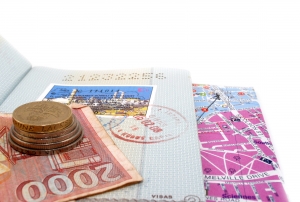Jou strandhuis is in die mark vir verkoop of verhuring. Die Franse paartjie het die advertensie op die internet gesien, kontak gemaak uit Frankryk en stel belang om jou strandhuis te koop of te huur vir vakansies in Suid-Afrika of selfs later in te woon indien die man se aanstelling as streeksbestuurder van die nuwe Afrika-been van sy Franse maatskappy realiseer. Is dit so maklik? Kan jy sommer net jou huis so oor die telefoon verhuur of verkoop aan hierdie buitelanders? Sal die transaksie geldig wees en is daar spesifieke vereistes vir so ‘n transaksie? Die antwoorde op hierdie vrae is van groot belang vir verhuurders en verkopers wat buitelandse huurders of kopers in gedagte het.
In kort, die antwoord is ‘ja’ dit kan so maklik wees. Buitelanders se eiendomstransaksies is onderhewig aan dieselfde wetgewing en regulasies as Suid-Afrikaners se eiendomstransaksies. ‘n Buitelander het dus nie nodig om fisies in Suid-Afrika teenwoordig te wees om jou strandhuis te huur of te koop nie.
Die koopprys van die eiendom kan deur die Franse paartjie in geheel met buitelandse fondse betaal word en is die enigste vereiste dat die buitelandse fondse in ‘n genomineerde Suid-Afrikaanse bankrekening inbetaal moet word. Hierdie bankrekening sal gewoonlik die trustrekening van die plaaslike oordragsprokureurs wees. Waar ‘n buitelander egter by ‘n plaaslike finansiële instelling finansiering wil aangaan vir die koop, is daar wel ‘n beperking dat slegs 50% van die totale koopprys by ’n Suid-Afrikaanse finansiële instelling geleen mag word.
Verder, indien die Franse paartjie die oordragsdokumente en verbanddokumente in Frankryk wil onderteken (buite die grense van Suid-Afrika) vereis ons reg dat die dokumente voor ‘n notaris van daardie land geteken moet word en dat die notaris se amp bevestig moet word deur die betrokke land se howe. Hierdie kan ‘n tydrowende proses wees waar die buitelanders nie by magte is om die dokumente in Suid-Afrika te kan onderteken nie. Hierdie addisionele vereistes is nie van toepassing op ‘n huurooreenkoms nie, omdat die ooreenkoms nie by die Aktekantoor registreer moet word nie.
Waar die Fransman se aanstelling later realiseer en hulle besluit om in jou strandhuis te woon, sal die paartjie se wettige verblyf hier onderworpe wees aan die Immigrasie Wet wat beteken dat hulle ‘n wettige permit moet verkry om in Suid-Afrika woonagtig te wees. Aangesien die koop of huur egter reeds gefinaliseer is, sal dit geen impak hê op die geldigheid van die voltooide koop of verhuring nie.
Ter samevatting, ‘n buitelander wat buite die grense van Suid-Afrika woonagtig is, mag eiendom in Suid-Afrika huur of koop. Die beperkings rakende plaaslike finansiering, veral waar die verkryging van finansiering `n opskortende voorwaarde van die ooreenkoms is, asook die vereistes vir ondertekening van dokumentasie in die buiteland, moet in gedagte gehou word aangesien dit tydrowend kan wees en addisionele kostes kan meebring voordat die eiendom registreer kan word.
In terms of our common law, any person with full legal capacity may enter into contracts in South Africa unhindered, and this is actually done on a daily basis - be it the foreign tourist who books accommodation or a flight, or purchases a souvenir, a car or a property, or an off-shore company wishing to conduct business in South Africa and entering into a contract for the purchase of South African goods.
If you receive an offer to purchase from a foreigner (i.e. non-resident) you may use your standard sale agreement and generally speaking, the agreement will be as binding as any contract concluded between two South African residents provided the non-resident had full legal capacity to conclude such contract.
Legal Capacity to enter into a sale agreement for land
The only difference in relation to property transfers is the provisions of the Matrimonial Property Act which determines the legal capacity of parties married in or out of community to enter into contracts for the sale of land.
For example, in terms of South African law, a minor, that is a person under the age of 18, would have to be assisted by his or her legal guardian in order to conclude a valid contract, and parties married in community of property will not be able to purchase property without the assistance of the other spouse in terms of the provisions of the Matrimonial Property Act.
Our Matrimonial Property Act does not however apply in respect of foreign marriages and the legal regime that determines the legal capacity of such person to conclude a contract for the sale of land, is determined by the laws of the country where such person was domiciled (living) at the time of the marriage.
The law of such other country will determine if such foreigner has the necessary legal capacity to enter into a contract for the purchase and sale of land in South Africa with or without the assistance of their spouse.
In terms of say Zimbabwean law, parties are generally able to conclude agreements for the purchase of land without the assistance of the other spouse and the same applies in respect of marriages concluded in the United Kingdom.
However, our courts and our Deeds Office cannot take cognisance of or apply foreign law as they would South African law.
The Deeds Office will thus not accept documentation signed by a person who was married in terms of foreign law unless the spouse of that person has consented to such sale and/or is a party to that transaction.
This means that you may have a perfectly valid sale agreement (depending on the marital status of the signatories in terms of their country of origin) but be unable to enforce it.
DEEDS OFFICE REQUIREMENTS IN ORDER TO EFFECT TRANSFER
A valid contract of sale does not in itself confer ownership of land, nor does it provide security for payment of a bond - transfer of ownership pursuant to a valid sale must take place in the Deeds Office.
In terms of our Deeds Office regulations, the Deeds Office requires both spouses to sign all transfer documents in order to pass ownership - regardless of whether or not the sale agreement required the signature of only one or both spouses.
The Deeds Office will not take cognisance of the provisions of foreign law and many sales come unstuck by virtue of this provision where for example, spouses are estranged and cannot be contacted.
The only way around it would be a declaration from the Embassy of such country setting out and confirming that the spouse would not require the assistance of the other spouse.
The transferring attorney's requirements in order to effect transfer would be similar to that of a transfer to a South African resident, except that both spouses would have to sign the conveyancing documentation.
The following documents would be required:
- a certified copy of the Purchasers’ passport;
- a certified copy of their work permit and temporary residency (if applicable);
- a certified copy of proof of residence and South African income tax number (only if applicable).
Estate agents should thus ensure that sale agreements are signed by both spouses in the event of a foreign marriage - this applies regardless of whether or not the person is a resident or non-resident.
Advice:
Make enquiries with your foreign buyer and establish up front if you are going to run into any problems - if so, your foreign buyer can purchase the property through a South African registered company in which event spousal consent would not be required.
FINANCING THE TRANSACTION
South African exchange control regulations determine the extent to which non-residents can borrow money locally to fund the purchase.
Non-resident purchaser who does not work in South Africa
A non-resident purchaser will not be allowed to borrow more than 50% of the purchase price to fund the purchase. The balance must be paid in cash and this may be cash generated in South Africa, or off shore funding.
Non-resident purchaser who is on a termporary work permit in South Africa
A person working in South Africa, and who has a temporary work permit, may borrow more than 50% of the purchase price, and the amount of the loan will depend on the bank’s criteria. A condition of the loan will however be that the purchaser reduces the bond to less than 50% of the registered amount before they return abroad.
Some banks may require a work permit of at least 4 years before they would consider a bond for more than 50% of the purchase price.
The banks generally will require the following documentation to consider a non-resident for bond approval:
- a certified copy of the passport;
- 3 months overseas bank statements;
- 3 months payslips (6 months statements and payslips where the Purchaser earns Commission or is paid overtime).
INVESTMENT OF FUNDS IN CONVEYANCERS TRUST ACCOUNT PENDING TRANSFER
Foreign Exchange and Banking regulations have now been amended with regard to the investments of funds for non-residents pending transfer. Conveyancers are no longer able to invest money in a Sec78(2A) account to earn interest for the benefit of the non-resident purchaser and such investments can only be made for people with SA identity documents.
This must be taken into consideration and the standard clause dealing with the investment of the deposit in an interest-bearing account for the benefit of a purchaser must be deleted - the funds will simply be held in trust pending transfer, with no interest accruing to the non-resident purchaser.
INTRODUCTION AND REPATRIATION OF FUNDS
Once a foreigner has introduced cash into the country with a view to purchasing a property, he can repatriate it (together with the profits thereon) provided he has brought the funds through the proper channels when it was first introduced to the country.
The following documentation should be retained by such non-resident purchaser to avoid delays with the repatriation of the funds on resale:
- proper proof must be kept by the foreign purchaser of the origin of the purchasing funds, including statements on the foreign transferring account as well as the receiving conveyancer’s bank statements;
- a copy of the original sale agreement.
Upon the eventual onward sale of the property, application will be made for Exchange Control Approval for the repatriation of the funds, supported by the following documents in addition to the documents as set out above:
- sale agreement (onward sale);
- conveyancers final statement of account reflecting calculation of the sale proceeds;
- foreign bank account information;
- ID and proof of residence of non-resident.
SIGNING OF CONVEYANCING DOCUMENTATION OUTSIDE THE COUNTRY
Conveyancing documents must be signed before either a notary public of the country where the person resides, or at the South African Consulate or Embassy in such country.
This can be a time consuming and expensive exercise which is governed in terms of international law. (The Hague Convention).
It is cheaper to sign such documents with the South African Embassy in say London but an appointments needs to be made to do so and this can take up valuable time.
